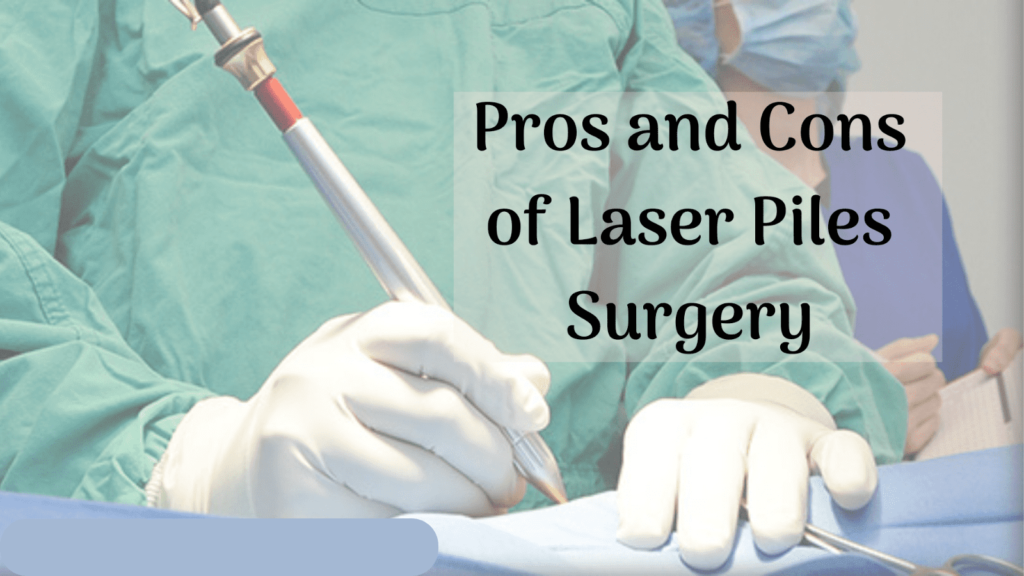
Understanding Piles
Piles, or hemorrhoids, are swollen veins in the rectum or anus that can cause discomfort, pain, and bleeding. They can be internal, located inside the rectum, or external, forming under the skin around the anus.Piles can result from various factors, including straining during bowel movements, chronic constipation or diarrhea, obesity, and pregnancy. While mild cases can often be managed with lifestyle changes and over-the-counter treatments, more severe cases may require medical intervention.
Laser Treatment for Piles: Exploring the Procedure
- What is Laser Treatment for Piles?
Laser treatment for piles involves the use of a focused beam of light to precisely target and shrink hemorrhoidal tissue. This minimally invasive procedure is typically performed on an outpatient basis and requires no incisions.
The Procedure
During the procedure, the patient is positioned comfortably, and a local anesthetic is administered to numb the area. The surgeon then inserts a small probe into the rectum, delivering laser energy to the affected hemorrhoidal tissue. This ablates or reduces the hemorrhoids.
Benefits of Laser Treatment
- Minimal Discomfort: Since laser treatment for piles is minimally invasive, it generally causes less discomfort and requires minimal downtime compared to traditional surgical options.
- Quick Recovery: Patients after surgery recover fast and can do their normal daily activities.
- Reduced Risk of Complications: The precise nature of laser treatment reduces the risk of complications such as bleeding and infection.
Potential Risks and Complications
While laser treatment for piles is considered safe for most patients, it may carry some risks and potential complications.
Mild Discomfort: Some patients may experience mild discomfort or pain during or after the procedure, which can usually be managed with over-the-counter pain relievers.
Bleeding: In rare cases, laser treatment may cause bleeding. However, this is typically minimal and resolves on its own.
Recurrence: While laser treatment effectively shrinks hemorrhoids, there is a small risk of recurrence over time.
Ensuring Safety and Efficacy
Patient Selection
To ensure the safety and efficacy of laser treatment for piles, healthcare providers carefully evaluate patients to determine if they are suitable candidates for the procedure. Factors such as the size and severity of the hemorrhoids, as well as the patient’s overall health, are taken into consideration.
Follow-Up Care
After undergoing laser treatment for piles, patients are typically advised to follow certain post-procedure care instructions to promote healing and reduce the risk of complications.
Dietary Changes: Following a high-fiber diet and staying well-hydrated can help prevent constipation and promote regular bowel movements, reducing the risk of recurrent hemorrhoids.
Avoiding Straining: Patients are advised to avoid straining during bowel movements, as this can exacerbate hemorrhoidal symptoms and increase the risk of recurrence.
Medications: Over-the-counter pain relievers and stool softeners may be recommended to manage discomfort and promote comfortable bowel movements during the recovery period.
FAQs (Frequently Asked Questions)
1. Is laser treatment for piles painful?
Laser treatment for piles is typically well-tolerated and causes minimal discomfort. Local anesthesia is used to numb the area during the procedure, reducing pain and discomfort.
2. What is recovery time for piles?
Recovery time can vary depending on the individual and the severity of the hemorrhoids. However, most patients can resume normal activities within a few days to a week after the procedure.
3. Are there any dietary restrictions after laser treatment for piles?
While there are no specific dietary restrictions, patients are generally advised to follow a high-fiber diet and stay well-hydrated to promote healthy bowel movements and reduce the risk of recurrent hemorrhoids.
4. Can laser treatment for piles cause complications?
While laser treatment for piles is considered safe, like any medical procedure, it may carry some risks and potential complications. These can include mild discomfort, bleeding, and in rare cases, recurrence of hemorrhoids.
5. Is laser treatment for piles suitable for everyone?
Healthcare providers carefully evaluate patients to determine if they are appropriate candidates for the procedure based on factors such as the size and severity of the hemorrhoids and the patient’s overall health.
6. How effective is laser treatment for piles?
Laser treatment for piles is generally effective in shrinking hemorrhoids and relieving symptoms. However, the long-term effectiveness may vary depending on factors such as the size and severity of the hemorrhoids and the patient’s adherence to post-procedure care instructions.
Conclusion
In conclusion, laser treatment for piles offers a safe and effective option for managing this common condition. While the procedure is generally well-tolerated and associated with minimal discomfort and downtime, patients should discuss their individual concerns and expectations and visit Padma Hospital to determine if laser treatment is the right choice for them.
